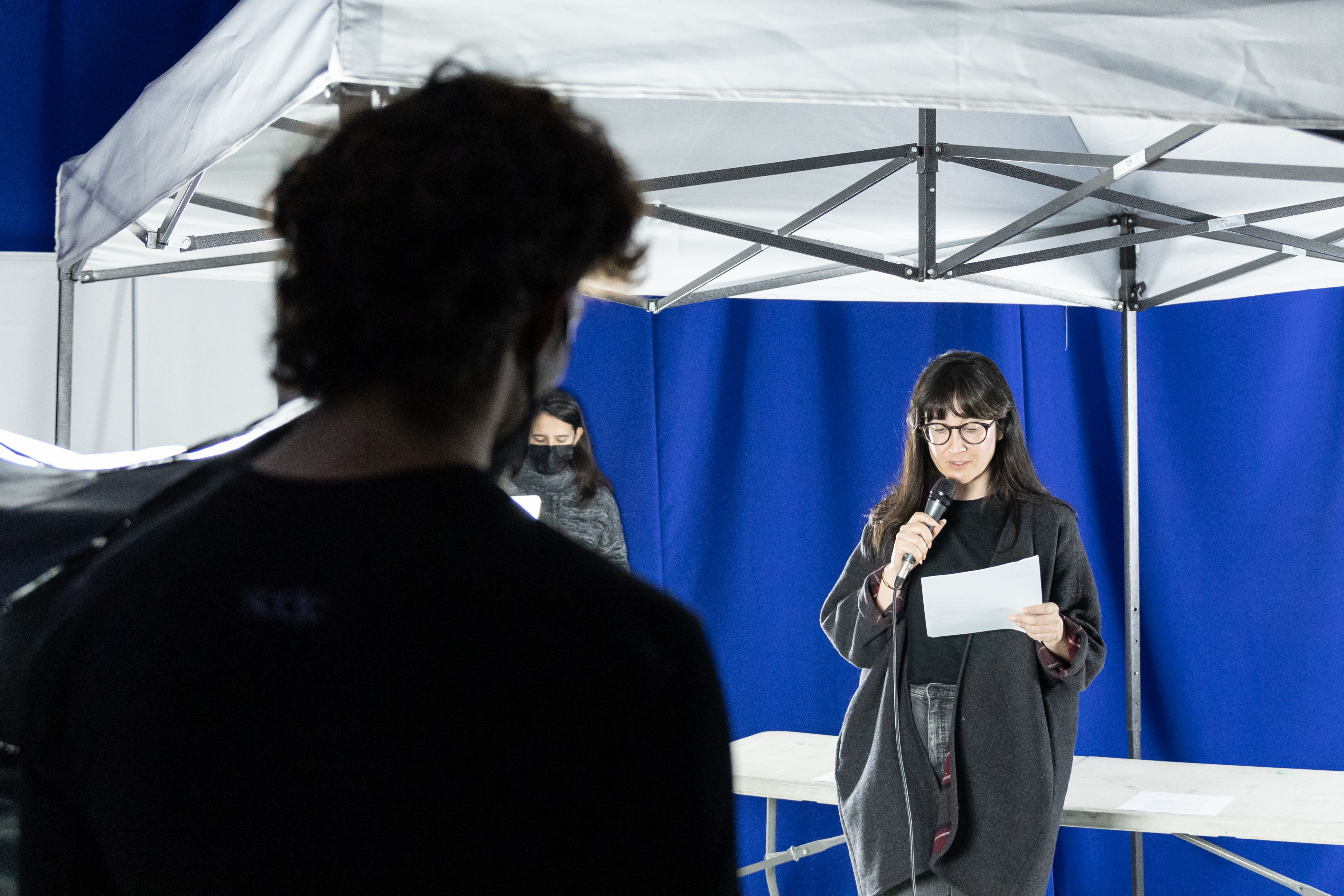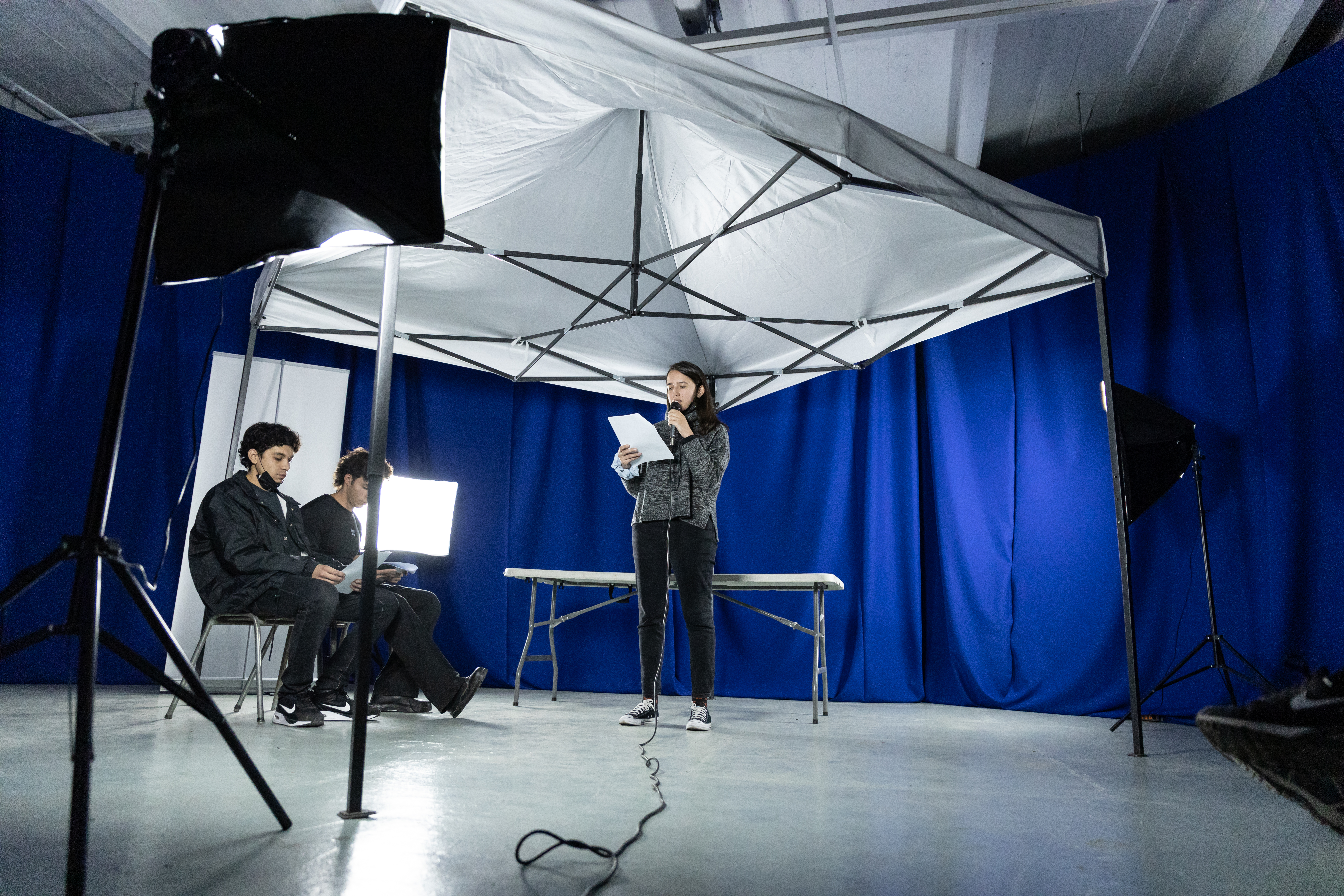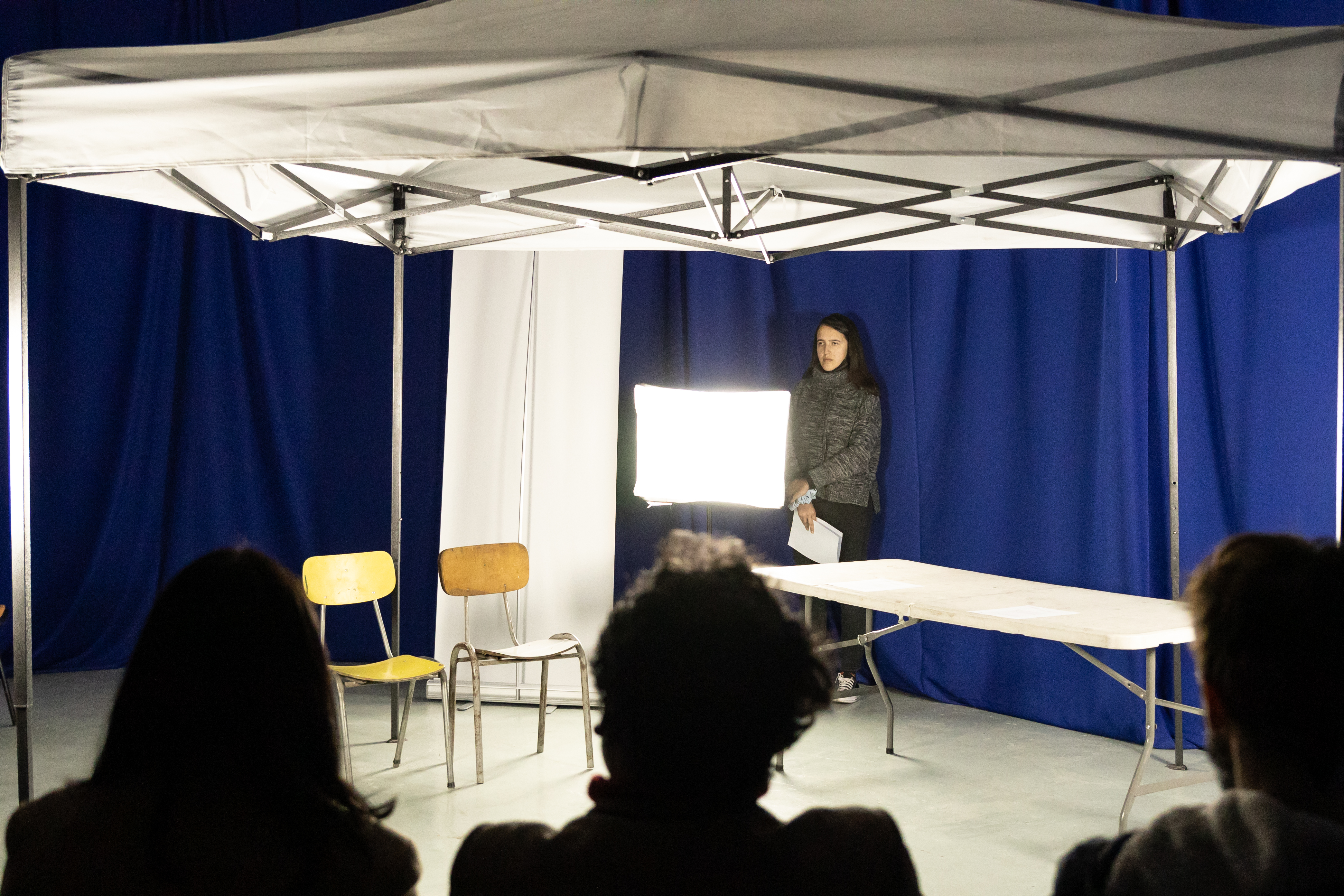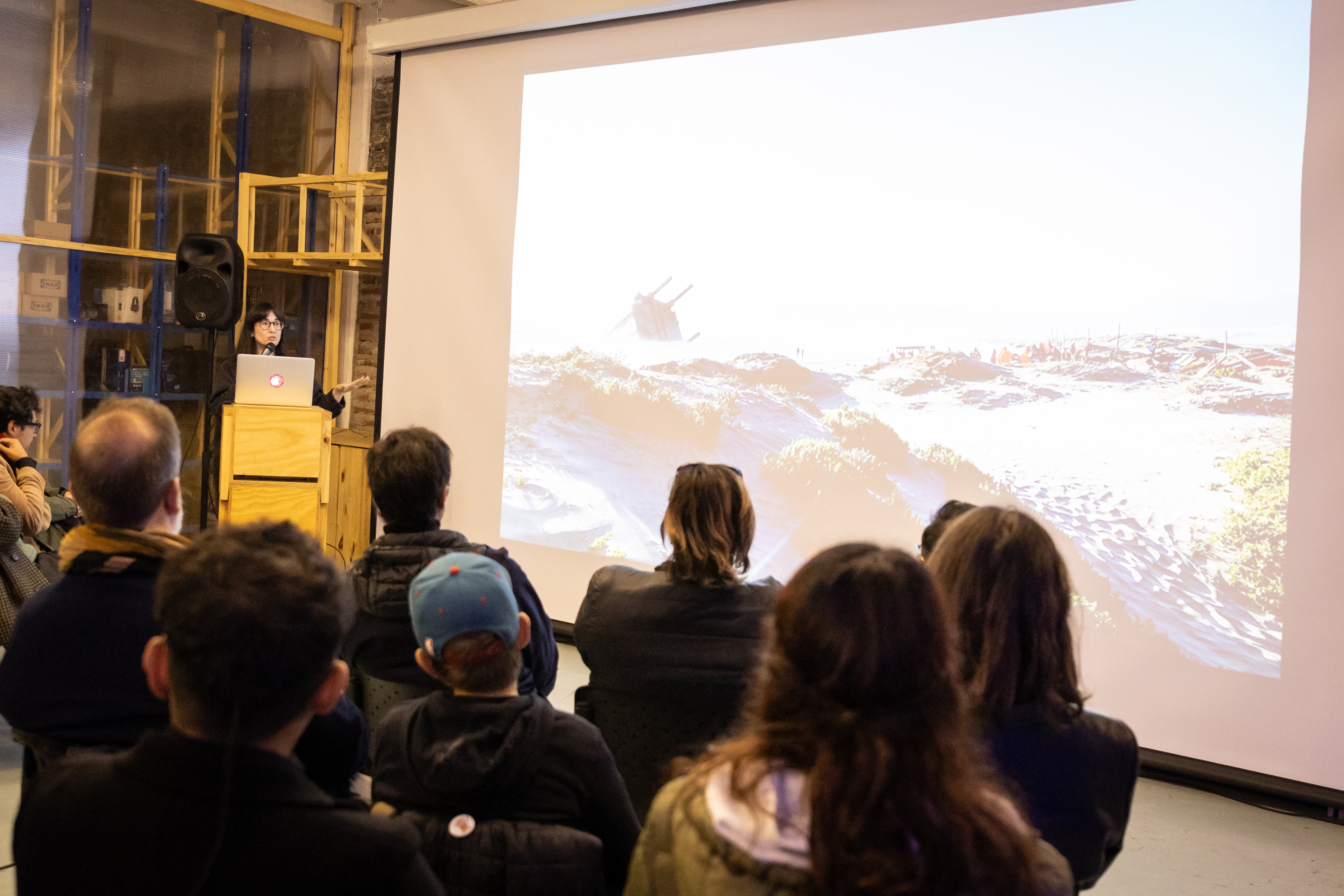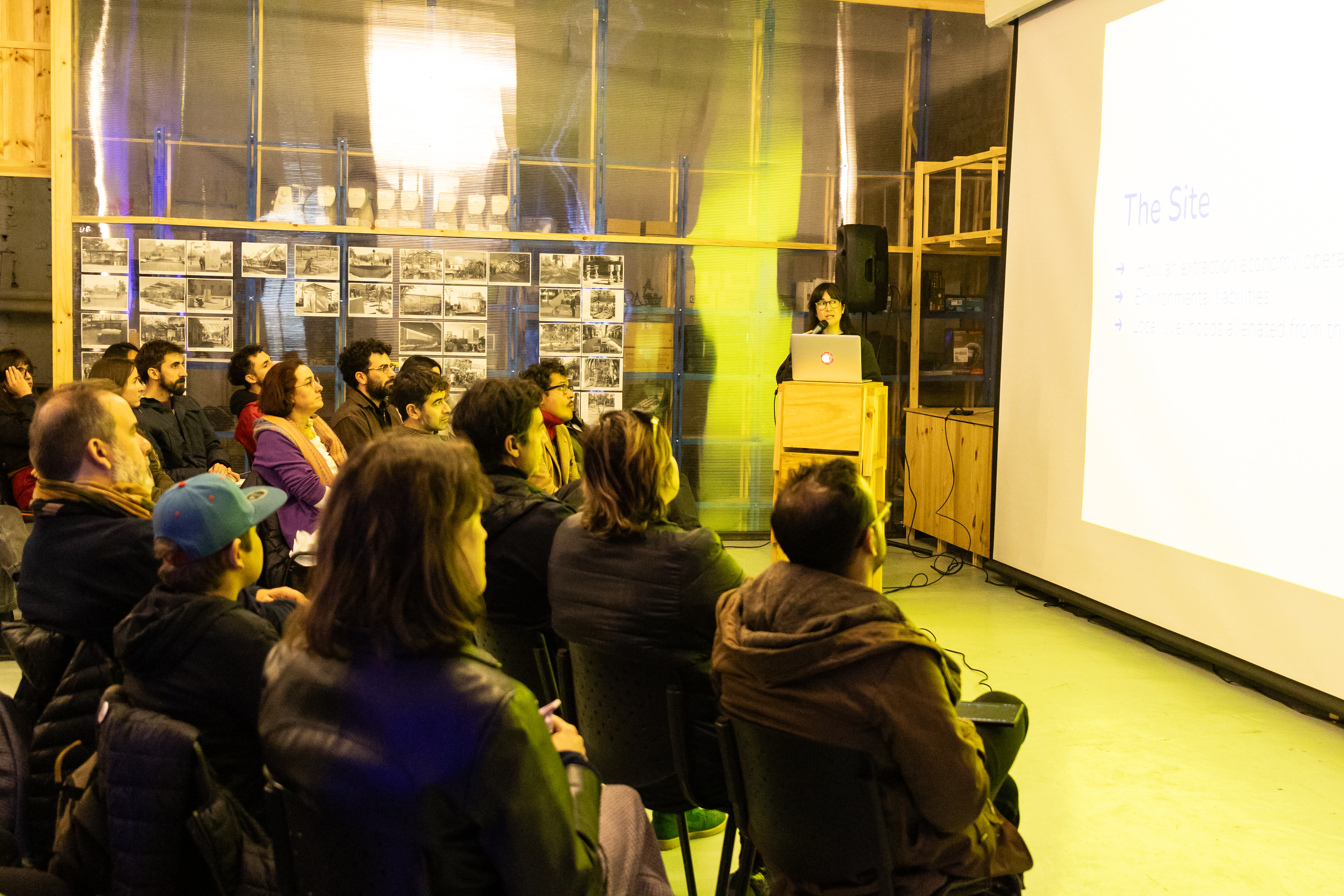👩🏻
I'm an architect, urban designer, and researcher working between Santiago and London. My research focuses on the spatial arrangements of extractive activities and their ecologies. Currently, I'm a PhD candidate at Goldsmiths' Centre for Research Architecture (CRA), where my dissertation, Landscape Ledgers: Fostering Environmental Publics through EIA’s Citizen Participation Processes in Areas of Socio-Environmental Conflict, explores environmental impact assessments and public engagement. I am also a graduate tutor for the MA in Research Architecture (2024–2025 cohort) at CRA.
As a scholar and practitioner my writing has been featured in publications, including Journal of Architectural Education 78:2 Worlding. Energy. Transitions (Taylor & Francis, 2024), DELUS: The Journal of the Institute of Landscape and Urban Studies (Hatje Cantz, 2024), and Architecture: From Public to Commons (Routledge, 2023). I`ve served as the guest editor for the peer-reviewed issue Materia Arquitectura: Matter Out of Place (Universidad San Sebastián, 2024). And most recently, I published “Participatory Monitoring: Foregrounding Sustenance Practices as a New Environmental Public,” in the Journal of Architectural Education in 2025.
I hold a master's degree in architecture and urban design from Columbia University's Graduate School of Architecture, Planning and Preservation (GSAPP) and a bachelor's degree in architecture from Universidad Técnica Federico Santa María (UTFMS)
🔗
2023 Visual Cultures Scholarship, Goldsmiths, University of London, UK
2022 Research Grant, Universidad de Las Américas, CL
2021 Production Grant Driving the Human Festival, DE
2020-2021 Incubator Prize, GSAPP, Columbia University, USA
2018 Prize for Excellence, MS Architecture and Urban Design, GSAPP, Columbia University, USA
2018 William Kinne Fellows Traveling Prize, GSAPP, Columbia University, USA
2024 EDUMEET 2024, Scientific committee, SPAIN/CHILE
2022 Regional Ambassador for Latin America GSAPP, USA
2021 Alumni Mentorship Program GSAPP, USA
2024 -2025 Graduate Tutor, MA Research Architecture, Centre for Research Architecture, Goldmsiths, London, UK
2025 Adjunct Architecture Studio Teacher School of Architecture, Universidad de Las Américas, Santiago, CL
2024 -2025 Associate Lecturer,Campus Creativo, Universidad Andrés Bello, Santiago, CL
2024 -Present Associate Lecturer, Master in Socio-Spatial Practices School of Architecture, Universidad de Las Américas, Santiago, CL
2020 -Present Co-founder AHORA, Santiago, Chile / London, UK
2021 - 2023 Associate Lecturer Faculty of Architecture, Animation, Construction, and Design (FAADC) , Universidad de Las Américas, Santiago, CL
2020 - 2021 Adjunct Architecture Studio Teacher School of Architecture, Universidad de Las Américas, Santiago, CL
2020 - 2021 Adjunct Architecture Studio Teacher Campus Creativo, Universidad Andrés Bello, Santiago, CL
2018 - 2019 Associate Research Scholar Center for Resilient Cities and Landscapes (CRCL), Columbia University, New York, USA
2017 - 2018 Events Assistant Graduate School of Architecture Planning and Preservation, Columbia University, Columbia University, New York, USA
2015 - 2017 Intermediate Architect GM Associated Architects, Santiago, CL
2024 Journal of Architecture Education 78:2 Worlding. Energy. Transitions (Publisher: Taylor & Francis) Essay “A New Ecological Contract: Tools to See Otherwise” https://doi.org/10.1080/10464883.2024.2381429
2024 DELUS. The Journal of the Institute of Landscape and Urban Studies. Chasing Water Issue 1 (Publisher: Hatje Cantz) Essay “Desalination and a New Environmental Public”
2023 Materia fuera de lugar. Matter out of Place (Publisher: Universidad San Sebastián) https://doi.org/10.56255/ma.v1i25.560
2023 Architecture from Public to Commons (Publisher: Routledge) Chapter “Unearthing and Reversing: Exhausting the Water Cycle.” Editor Marcelo López- Dinardi. https://doi.org/10.4324/9781003349785
2023 Esto no es Arquitectura / This is not Architecture (Publisher: Ediciones Academia Espacial) Featured as one of the interview transcripts with sixteen Chilean architects expanding what it means to practice architecture today in Chile. Edited by Fernando Portal, Bárbara Rozas & Rodrigo Valenzuela Jerez
2022 KERB 30. Power: Resistance and Surrender. Agency in a landscape of uncertainty (Publisher: RMIT) Essay: Toxic Custodians: New Post Extractivism Economies or Three Future Mythologies and A Whisper. with AHORA
2022 Monumental Wastelands Magazine Issue 1: Autonomy (Publisher: Pareid) Essay: ¿Qué pasa cuando la mina cierre? What happens when the mine closes? with AHORA
2022 Paprika! Reading The Room. Volume 7, Issue 07 (Publisher: Yale School of Architecture) Essay: Remote Closeups, Scene 1. with AHORA
2021 Empathy Revisited: Design for more than one, 5th Istanbul Design Biennial Catalog The Avocado Toast entry featured in the biennial catalog
2019 Workshop Report: Pantanoso Basin Developed for CRCL with Intendencia de Montevideo and 100 Resilient Cities at Columbia University
2019 Workshop Report: Designing for El Yaque Del Norte Developed for CRCL with Municipalidad de Santiago de los Caballeros and 100 Resilient Cities at Columbia University
2012 Revista de Urbanismo (27) Schilling, L. (2012). “Terralatos”, análisis cualitativo de relatos biográficos en el contexto del espacio en crisis. Revista De Urbanismo, 14(27), Pág. 14-41. https://doi.org/10.5354/ru.v14i27.26402
2010 SCL 2110 Catalog Ubiquity Canals entry featured in the biennial catalog. Tisi, R. (2010). SCL2110 (1st ed., p. 607). Santiago, Chile: Uqbar.
2023 Sensing the Environment Multidisciplinary symposium at RISD focused on just climate futures. With the participation of sTo len, LinYee Yuan, Felipe Shibuya, Paulo Tavares, Maggie Tsang, and Gabriel Cuéllar. Organized by Amelyn Ng.
2023 Encuentro Latinoamericano de Estudiantes de Arquitectura (ELEA) Costa Rica Delivered a week-long workshop with Wai Think Tank (Natalie Frankowski and Cruz García) and Alejandro Alcázar on extractivisms and decolonial architectural practices with Latin American undergraduate architecture students
2023 Sensing the Environment Group exhibit at BEB Gallery, Rhode Island School of Design. Curated by Amelyn Ng
2022 13th Sao Paulo Architecture Biennial Participant with Two talking trees / Una conversación entre dos árboles, a installation and video essay with AHORA and Luciana Varkulja
2021 Driving the Human Festival: 21 Vision for Eco-social Renewal A participant with Toxicity Distributed: Post-extractive economies, one of the 21 selected projects by Driving the Human, an initiative led by – acatech – National Academy of Science and Engineering, Forecast, the Karlsruhe University of Arts and Design and ZKM | Center for Art and Media Karlsruhe, exhibited at Radialsystem in Berlin, Germany, between 15-17th October 2021.
2020 Empathy Revisited: Design for more than one, 5th Istanbul Design Biennial Produced the video essay “The Avocado Toast” for the Biennials` “Cooking Show,” a collaboration between e-flux Architecture and the Istanbul Design Biennial within the context of its fifth edition. Curated by Mariana Pestana, Sumitra Upham, and Billie Muraben
2019 Seul Biennial Contributor to the group exhibition Speculative City: Crisis, Turmoil, And Projections In Architecture by David Eugin Moon. My contribution included a 3D-printed object of Aqaba`s SEZ polygon and an illustration for the “Speculative Urbanism” seminar taught by David Eugin Moon in the fall of 2018 at the Graduate School of Architecture Planning and Preservation at Columbia University.
2016 100 en 1 día Participant at “100en1día”, an urban interventions festival held in Santiago and other cities around South America, with the short film “Volutorios,” the film exhibited at the open plaza of MAVI (Museum of Visual Arts)
2010 SCL 2110 Participant with the work “Ubiquity Canals” selected as undergraduate student work exhibited at the SCL 2110 exhibition curated by Rodrigo Tisi
2022 Momento Interviews with practitioners that influence architecture, organized by the School of Architecture at Universidad de Las Américas
2021 - 2022 Cielo Falso A pre-recorded interview with current thinkers and practitioners that influence architecture organized by the FAADC at Universidad de Las Américas
2020 Propagaciones An interview series with architects shaping the discourse of architecture was organized by Campus Creativo at Universidad Andrés Bello and Archdaily.
As a scholar and practitioner my writing has been featured in publications, including Journal of Architectural Education 78:2 Worlding. Energy. Transitions (Taylor & Francis, 2024), DELUS: The Journal of the Institute of Landscape and Urban Studies (Hatje Cantz, 2024), and Architecture: From Public to Commons (Routledge, 2023). I`ve served as the guest editor for the peer-reviewed issue Materia Arquitectura: Matter Out of Place (Universidad San Sebastián, 2024). And most recently, I published “Participatory Monitoring: Foregrounding Sustenance Practices as a New Environmental Public,” in the Journal of Architectural Education in 2025.
I hold a master's degree in architecture and urban design from Columbia University's Graduate School of Architecture, Planning and Preservation (GSAPP) and a bachelor's degree in architecture from Universidad Técnica Federico Santa María (UTFMS)
🔗
Awards / Grants
2024 Graduate School Grant, Goldsmiths, University of London, UK2023 Visual Cultures Scholarship, Goldsmiths, University of London, UK
2022 Research Grant, Universidad de Las Américas, CL
2021 Production Grant Driving the Human Festival, DE
2020-2021 Incubator Prize, GSAPP, Columbia University, USA
2018 Prize for Excellence, MS Architecture and Urban Design, GSAPP, Columbia University, USA
2018 William Kinne Fellows Traveling Prize, GSAPP, Columbia University, USA
Appointments
2025 Chilean Pavilion 19th International Architecture Exhibition Venice Biennale, Co-curator, ITALY/CHILE2024 EDUMEET 2024, Scientific committee, SPAIN/CHILE
2022 Regional Ambassador for Latin America GSAPP, USA
2021 Alumni Mentorship Program GSAPP, USA
Academia / Practice
2024 -2025 Graduate Tutor, MA Research Architecture, Centre for Research Architecture, Goldmsiths, London, UK
2025 Adjunct Architecture Studio Teacher School of Architecture, Universidad de Las Américas, Santiago, CL
2024 -2025 Associate Lecturer,Campus Creativo, Universidad Andrés Bello, Santiago, CL
2024 -Present Associate Lecturer, Master in Socio-Spatial Practices School of Architecture, Universidad de Las Américas, Santiago, CL
2020 -Present Co-founder AHORA, Santiago, Chile / London, UK
2021 - 2023 Associate Lecturer Faculty of Architecture, Animation, Construction, and Design (FAADC) , Universidad de Las Américas, Santiago, CL
2020 - 2021 Adjunct Architecture Studio Teacher School of Architecture, Universidad de Las Américas, Santiago, CL
2020 - 2021 Adjunct Architecture Studio Teacher Campus Creativo, Universidad Andrés Bello, Santiago, CL
2018 - 2019 Associate Research Scholar Center for Resilient Cities and Landscapes (CRCL), Columbia University, New York, USA
2017 - 2018 Events Assistant Graduate School of Architecture Planning and Preservation, Columbia University, Columbia University, New York, USA
2015 - 2017 Intermediate Architect GM Associated Architects, Santiago, CL
Publications
2025 Journal of Architecture Education 79:1 Architecture Beyond Extraction (Publisher: Taylor & Francis) Essay “Participatory Monitoring” https://doi.org/10.1080/10464883.2025.24632942024 Journal of Architecture Education 78:2 Worlding. Energy. Transitions (Publisher: Taylor & Francis) Essay “A New Ecological Contract: Tools to See Otherwise” https://doi.org/10.1080/10464883.2024.2381429
2024 DELUS. The Journal of the Institute of Landscape and Urban Studies. Chasing Water Issue 1 (Publisher: Hatje Cantz) Essay “Desalination and a New Environmental Public”
2023 Materia fuera de lugar. Matter out of Place (Publisher: Universidad San Sebastián) https://doi.org/10.56255/ma.v1i25.560
2023 Architecture from Public to Commons (Publisher: Routledge) Chapter “Unearthing and Reversing: Exhausting the Water Cycle.” Editor Marcelo López- Dinardi. https://doi.org/10.4324/9781003349785
2023 Esto no es Arquitectura / This is not Architecture (Publisher: Ediciones Academia Espacial) Featured as one of the interview transcripts with sixteen Chilean architects expanding what it means to practice architecture today in Chile. Edited by Fernando Portal, Bárbara Rozas & Rodrigo Valenzuela Jerez
2022 KERB 30. Power: Resistance and Surrender. Agency in a landscape of uncertainty (Publisher: RMIT) Essay: Toxic Custodians: New Post Extractivism Economies or Three Future Mythologies and A Whisper. with AHORA
2022 Monumental Wastelands Magazine Issue 1: Autonomy (Publisher: Pareid) Essay: ¿Qué pasa cuando la mina cierre? What happens when the mine closes? with AHORA
2022 Paprika! Reading The Room. Volume 7, Issue 07 (Publisher: Yale School of Architecture) Essay: Remote Closeups, Scene 1. with AHORA
2021 Empathy Revisited: Design for more than one, 5th Istanbul Design Biennial Catalog The Avocado Toast entry featured in the biennial catalog
2019 Workshop Report: Pantanoso Basin Developed for CRCL with Intendencia de Montevideo and 100 Resilient Cities at Columbia University
2019 Workshop Report: Designing for El Yaque Del Norte Developed for CRCL with Municipalidad de Santiago de los Caballeros and 100 Resilient Cities at Columbia University
2012 Revista de Urbanismo (27) Schilling, L. (2012). “Terralatos”, análisis cualitativo de relatos biográficos en el contexto del espacio en crisis. Revista De Urbanismo, 14(27), Pág. 14-41. https://doi.org/10.5354/ru.v14i27.26402
2010 SCL 2110 Catalog Ubiquity Canals entry featured in the biennial catalog. Tisi, R. (2010). SCL2110 (1st ed., p. 607). Santiago, Chile: Uqbar.
Symposia
2023 Pensar el Antropoceno Desde el Sur . Organized by Instituto de Estética Pontificia Universidad Católica de Chile. PANEL: Naturocultural Hybrids from Science-Based Fiction and Practice-Based Research. Presentation title: "Tools to see otherwise: multiscale simulations for new climate fictions."2023 Sensing the Environment Multidisciplinary symposium at RISD focused on just climate futures. With the participation of sTo len, LinYee Yuan, Felipe Shibuya, Paulo Tavares, Maggie Tsang, and Gabriel Cuéllar. Organized by Amelyn Ng.
Workshops
2024 "Humedales enmarañados" | Núcleo Milenio + CCA + ARQ UC Invited as a subject matter expert to deliver a talk on Environmental Impact Assessments2023 Encuentro Latinoamericano de Estudiantes de Arquitectura (ELEA) Costa Rica Delivered a week-long workshop with Wai Think Tank (Natalie Frankowski and Cruz García) and Alejandro Alcázar on extractivisms and decolonial architectural practices with Latin American undergraduate architecture students
Exhibitions
2024 Landscape Ledgers & Rehearsing Environmental Publics Lecture and performance at Núcleo Lenguaje y Creación NLC/UDLA2023 Sensing the Environment Group exhibit at BEB Gallery, Rhode Island School of Design. Curated by Amelyn Ng
2022 13th Sao Paulo Architecture Biennial Participant with Two talking trees / Una conversación entre dos árboles, a installation and video essay with AHORA and Luciana Varkulja
2021 Driving the Human Festival: 21 Vision for Eco-social Renewal A participant with Toxicity Distributed: Post-extractive economies, one of the 21 selected projects by Driving the Human, an initiative led by – acatech – National Academy of Science and Engineering, Forecast, the Karlsruhe University of Arts and Design and ZKM | Center for Art and Media Karlsruhe, exhibited at Radialsystem in Berlin, Germany, between 15-17th October 2021.
2020 Empathy Revisited: Design for more than one, 5th Istanbul Design Biennial Produced the video essay “The Avocado Toast” for the Biennials` “Cooking Show,” a collaboration between e-flux Architecture and the Istanbul Design Biennial within the context of its fifth edition. Curated by Mariana Pestana, Sumitra Upham, and Billie Muraben
2019 Seul Biennial Contributor to the group exhibition Speculative City: Crisis, Turmoil, And Projections In Architecture by David Eugin Moon. My contribution included a 3D-printed object of Aqaba`s SEZ polygon and an illustration for the “Speculative Urbanism” seminar taught by David Eugin Moon in the fall of 2018 at the Graduate School of Architecture Planning and Preservation at Columbia University.
2016 100 en 1 día Participant at “100en1día”, an urban interventions festival held in Santiago and other cities around South America, with the short film “Volutorios,” the film exhibited at the open plaza of MAVI (Museum of Visual Arts)
2010 SCL 2110 Participant with the work “Ubiquity Canals” selected as undergraduate student work exhibited at the SCL 2110 exhibition curated by Rodrigo Tisi
Public Programming
2022 3rd International Architecture & Ethnography Seminar An in-person international seminar financed by the National Council for Arts and Culture that brought international thinkers and practitioners together in different cities in Chile. The seminar also hosted workshops and an exhibition of works received through an open call and work from guests.
2022 Momento Interviews with practitioners that influence architecture, organized by the School of Architecture at Universidad de Las Américas
2021 - 2022 Cielo Falso A pre-recorded interview with current thinkers and practitioners that influence architecture organized by the FAADC at Universidad de Las Américas
2020 Propagaciones An interview series with architects shaping the discourse of architecture was organized by Campus Creativo at Universidad Andrés Bello and Archdaily.
UPGRADE PORTFOLIO
October 2023 - September 2025This portfolio comprises public-facing events that explore the idea of training, rehearsing, and performing SEIA archives, as well as filings submitted to the Chilean Environmental Impact Assessment System, with the aim of embedding concerns into the public record of the case study developed for the dissertation.
Reflective Intelligences_Chilean Pavilion at the 19th Venice Architecture Bienale
May 2025 - Nov 2025
Installation
Venice, Italy
Reflective Intelligences is Chile’s curatorial proposal for the 19th Venice Architecture Biennale, curated by Carlo Ratti under the theme “Intelligences: Collective, Natural, Artificial.”
The Pavilion of Chile invites visitors to reconsider intelligence not solely as a computational attribute, but as something also shaped through deliberation, resistance, and the entangled relations between natural, artificial, and communal forms of knowledge—all experienced through the act of “reflection.” To possess reflective intelligence is to cultivate critical thought from multiple embodied perspectives—to stand in someone else’s place. In Chile, this has often been enabled through roundtables.
The mesa de trabajo, or roundtable, is a rhetorical and institutional figure used by the Chilean government, referring both to a physical object and to an assembly of diverse actors convened to address pressing issues. In this case, the table becomes a site of debate around controversies stemming from national AI policy. Reflective Intelligences places the table at the heart of the pavilion. By mimicking the double meaning of “roundtable,” it also plays on the dual sense of “reflective”—as both the act of mirroring and an invitation to deep consideration.
At the center of the pavilion, a table projects a video essay that reflects off water—an element simultaneously reduced to a computational resource and central to community struggles around the environmental impacts of data infrastructures. Surrounding the table are 25 scale models that expose the often opaque, black-box nature of these architectures. Together, they present two pathways for engaging with the infrastructural challenges of AI futures: one through the design of assemblies for environmental deliberation and monitoring, and the other through a critical engagement by design disciplines with both the intended and unintended consequences of these infrastructures.
Reflective Intelligences seeks to amplify the voices of those excluded or stripped of agency over their territories due to the expansion of digital infrastructures—developments that have made Chile the country with the fastest internet speeds in the Americas and Europe. From non-human actors such as wetlands to community organizations, these voices grapple with participation in environmental processes that often lack mandatory public consultation. The stories shared around this table reveal a different narrative.
In response to the curator’s call for “One place, one solution,” Reflective Intelligences argues that solutions do not arise from technology alone, but from spaces of deliberation where collective, natural, and artificial intelligences intersect. The pavilion challenges AI-driven entrepreneurial discourse by foregrounding local struggles over the materiality of the cloud—struggles that resonate globally. From one place, one approach emerges: a blueprint for contestation in solidarity.
The activity was funded by the Chilean goverment via the Ministerio de las Culturas, las Artes y el Patrimonio
Pavilion website 🔗
SELECTED INTERNATIONAL (ENGLISH) MEDIA COVERAGE
Le Monde 🗞
El País 🗞
Domus 🗞
Archdaily 🗞
Designboom 🗞
Interni Magazine 🗞
L'Officiel 🗞
All images by Cristóbal Palma











SEIA Public Record interventions
March 2025
Comment submissions
Online
Between March 24 and 26 of this year, I uploaded five entries to the SEIA online platform, entries which were not only written comments but also accompanying annexed files. The platform has no restrictions on file type or attachment size per submission, but it does limit the number of files to one. This limitation can, however, be easily bypassed by including links within the written comment. The annexed files were research outputs developed during the first year of PhD research, with one predating that period. The outputs included a book chapter, an essay for a student-led journal, an essay published in a peer-reviewed journal, and an online recording from an event titled Landscape Ledgers / Rehearsing Environmental Publics, developed as part of a doctoral fellowship in May 2024. With each comment submission, a short paragraph addressed not only the project owner who must respond to each observation, but also the other 352 comment submitters, as all comments are made public by virtue of being filed, while at the same time embedding these materials in perpetuity into the mine`s EIA records. Even though not all public records qualify as archives, in Chile, under Decree Law 5200, all public organizations are legally obligated to transfer documentation to the National Archives. In 2012, the SEA (Sistema de Evaluación Ambiental, Environmental Evaluation Service) began transferring its first batch of digitized documents, thereby securing in perpetuity what Daston calls “third nature”: the findings of science selected to endure, preserved in baselines.
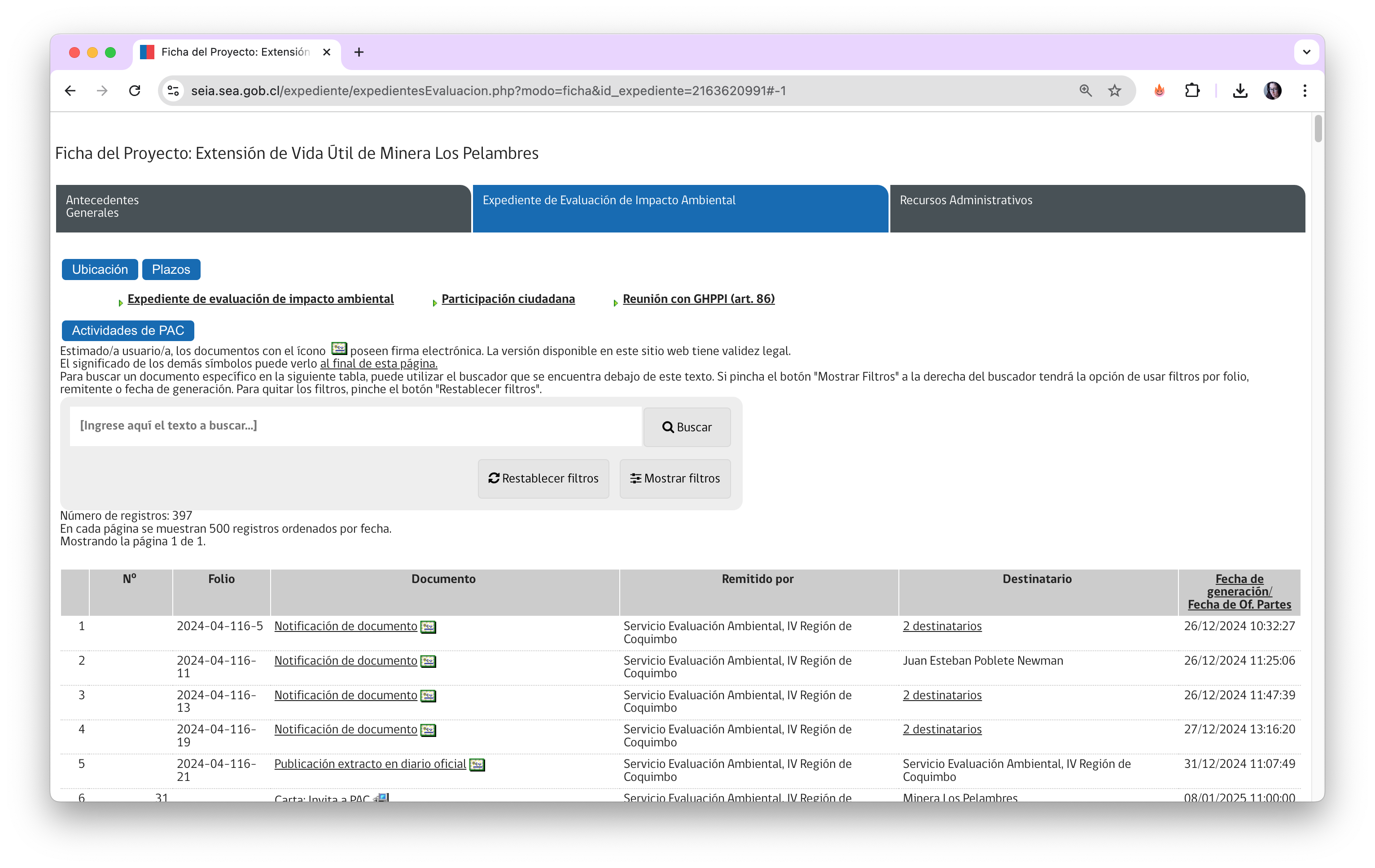





Rehearsing Environmental Publics
May 2024
Lecture / Performance
Santiago, Chile
Rehearsing Environmental Publics was a presentation and performance carried out as part of a doctoral residency at the Núcleo Lenguaje y Creación at the Faculty of Architecture, Animation, Design, and Construction at Universidad de Las Américas.
Both activities served as an opening of the ongoing doctoral research conducted at the Centre for Research Architecture at Goldsmiths, University of London. The research addresses the different visual regimes within Environmental Impact Assessments (EIA), seeking to foster the development of “environmental publics” through the citizen participation processes embedded in EIAs and carried out in areas of socio-environmental conflict.
Based on this material, the presentation included the staging of a citizen participation session, using as a basis the material conditions under which these are produced by mining companies. In this scene, a group of actors rehearsed a live reading of selected texts written by residents of conflict zones, originally submitted as part of the citizen participation processes in EIAs. These texts, written directly on digital comment submission platforms, are typically read only silently by those who process them for integration into the EIA reports.
The activity was funded by the Graduate School Grant at Goldsmiths
Recording 🔗
Núcleo Lenguaje y Creación website 💻
Participatory Monitoring:
Foregrounding Sustenance Practices as a New Environmental Public / Journal of Architecture Education
12–05–2024
Article
Abstract
Schilling Cuellar, L. (2025). Participatory Monitoring: Foregrounding Sustenance Practices as a New Environmental Public. Journal of Architectural Education, 79(1), 70–81. https://doi.org/10.1080/10464883.2025.2463294
Abstract
This essay explores the relationship between extraction activities and the subsistence economies they impact to advocate for the emergence of a new political category—what Lesley Green refers to as environmental public. With a Chilean copper mine as a case study, this essay recognizes sustenance practices (such as farming, herding, and fishing) as material witnesses that register environmental change in and around extraction sites. With a recent update to national legislation—to comply with the Escazú Agreement—it is possible to posit sustenance practices as essential for the now mandatory participatory monitoring of environmental change within these sites. This could center these sustenance practices and bring them forward from the fringes of economic development. Reviewing environmental impact assessment reports as records of landscape transactions, and conducting fieldwork around the mines’ operational landscapes, reveals how the copper industry neglects to register the relational damage done by extractive activities. With an upcoming project phase to extend the copper mine’s operations, this essay considers how spatial disciplines might learn from and assist in supporting monitoring activities for this new environmental public.
Schilling Cuellar, L. (2025). Participatory Monitoring: Foregrounding Sustenance Practices as a New Environmental Public. Journal of Architectural Education, 79(1), 70–81. https://doi.org/10.1080/10464883.2025.2463294
🔗


Environmental Publics: The Spatial Politics of Environmental Decision Spaces / Critical Ecologies Seminar
31–03–2025
Seminar presentation
A research stream at Goldsmiths, University of London that investigates global warming, environmental justice, colonial dispossession, climate migration, species extinction, media ecologies, and extractivism from an arts and humanities perspective
A research stream at Goldsmiths, University of London that investigates global warming, environmental justice, colonial dispossession, climate migration, species extinction, media ecologies, and extractivism from an arts and humanities perspective
🔗

Desalination and a New Environmental Public / DELUS
01–11–2024
Article
Issue abstract
This new issue of DELUS: The Journal of the Institute of Landscape and Urban Studies, entitled “Chasing Water,” brings together contributions on the topic of water. Nine essays invite us to explore different manifestations of the element. DELUS uses the term “chasing” to highlight the role of water in shaping and sustaining landscapes and urban environments, and the ongoing efforts to direct its course. From the transformation of English moorland and marshland to intricate irrigation systems in the Mediterranean and to the ecological impact of water harvesting schemes in Chile and Australia, each contribution explores the ways in which water is tracked, obstructed, or contained. “Chasing Water” vividly reflects the contradictory challenge of capturing, storing, and distributing the element in a world where it is theoretically abundant, but in many places inaccessible.
Chapter:
Issue abstract
This new issue of DELUS: The Journal of the Institute of Landscape and Urban Studies, entitled “Chasing Water,” brings together contributions on the topic of water. Nine essays invite us to explore different manifestations of the element. DELUS uses the term “chasing” to highlight the role of water in shaping and sustaining landscapes and urban environments, and the ongoing efforts to direct its course. From the transformation of English moorland and marshland to intricate irrigation systems in the Mediterranean and to the ecological impact of water harvesting schemes in Chile and Australia, each contribution explores the ways in which water is tracked, obstructed, or contained. “Chasing Water” vividly reflects the contradictory challenge of capturing, storing, and distributing the element in a world where it is theoretically abundant, but in many places inaccessible.
Chapter:
Desalination and a New Environmental Public
DOI:10.61608/9783775758758-008
In book: Delus. The Journal of the Institute of Landscape and Urban Studies (pp.74-81)
DOI:10.61608/9783775758758-008
In book: Delus. The Journal of the Institute of Landscape and Urban Studies (pp.74-81)
🔗


